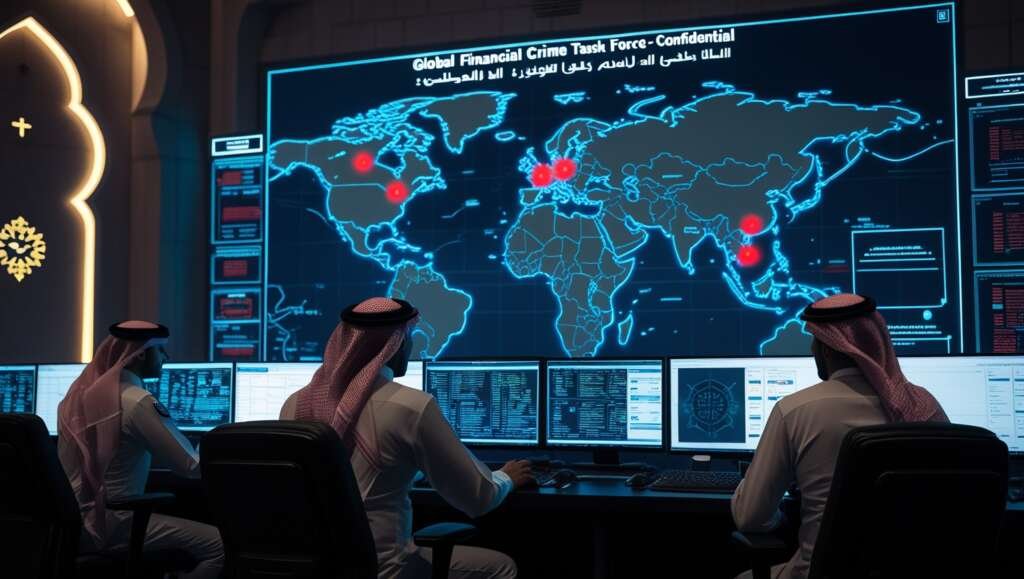Think of it as a global cat-and-mouse chase — but the stakes are billions of dollars and global security. Criminal networks constantly attempt to disguise illicit gains from activities like fraud, drug trafficking, and corruption. Worse still, some channel these funds to fuel terrorism under the radar of global financial systems.
In the dynamic economies of the Middle East and North Africa, one regional body plays a critical role in disrupting these threats: the Middle East and North Africa Financial Action Task Force (MENAFATF). Operating behind the scenes, MENAFATF sets the regional standard for fighting money laundering, terrorist financing, and the misuse of financial systems.
The Middle East and North Africa Financial Action Task Force (MENAFATF) serves as the region’s primary intergovernmental body dedicated to combating money laundering, terrorist financing, and related threats to the integrity of the financial system. Through coordinated efforts across member jurisdictions, MENAFATF strengthens regulatory frameworks, enhances cross-border cooperation, and promotes compliance with international standards. Its role is essential in preserving financial stability and safeguarding economic resilience across the region—including within the United Arab Emirates.
Why MENAFATF Was Born?
The global nature of financial crime means that a weakness in one country’s defenses can quickly become a vulnerability for many. Money laundering, the process of disguising the illegal origins of funds (from drug trafficking, fraud, corruption, etc.) to make them appear legitimate, and terrorism financing, the provision of financial support for terrorist acts, are inherently cross-border challenges. No single nation can tackle them alone.
Recognizing this critical need for collective action, particularly within the culturally and economically diverse MENA region, leaders gathered in Manama, Bahrain, to establish MENAFATF. Its creation mirrored the model of the Financial Action Task Force (FATF), the global standard-setter in combating financial crime. The FATF, headquartered in Paris, lays down 40 comprehensive recommendations – essentially, the world’s most authoritative playbook for safeguarding financial systems.
MENAFATF’s core mandate is to translate these global standards into practical, effective measures tailored to the specific context of the MENA region. It’s about ensuring that while respecting each member’s unique laws and customs, the fundamental principles of financial security are universally applied to detect sophisticated criminal networks.
The Dual Mission: Choking Off Illicit Funds
MENAFATF’s strategic objectives are clear and resolute:
- Dismantling Money Laundering (ML) Operations: MENAFATF helps countries track down and break apart the complicated routes criminals use to clean dirty money. These funds often move through multiple accounts and cross borders to hide their illegal origin. By supporting stronger laws, smarter investigations, and better reporting systems, MENAFATF helps its members expose and stop these laundering networks.
- Stopping Terrorism Financing (TF): Terrorist groups rely on money to plan and carry out their activities—even if that money comes from legal sources. MENAFATF works with countries to detect and freeze funds linked to terrorism, making it harder for these groups to operate. It’s about cutting off the financial lifelines before harm can be done.
To achieve these formidable goals, MENAFATF engages in several key activities:
- Fostering Regional Collaboration and Information Exchange: Financial criminals exploit gaps in communication between countries. MENAFATF provides an essential platform for member states to share vital intelligence, emerging trends (known as “typologies” of financial crime), and best practices in AML/CFT. This collaborative environment ensures that countries learn from each other’s experiences and respond cohesively to evolving threats.
- Driving Implementation of Global Standards (FATF 40 Recommendations): This is the bedrock of MENAFATF’s work. The 40 FATF Recommendations cover every facet of an effective AML/CFT system. This includes demanding strong national laws that criminalize money laundering and terrorism financing, requiring financial institutions to conduct thorough “Customer Due Diligence” (knowing who their customers are), mandating the reporting of suspicious transactions, and establishing specialized Financial Intelligence Units (FIUs) to analyze these reports. MENAFATF provides guidance and support to ensure these standards are not just on paper but are effectively implemented and enforced within each country’s national system.
- The Rigorous “Mutual Evaluation” Process: One of MENAFATF’s most powerful tools is its “mutual evaluation” program. This is a peer-review system where experts from various member countries conduct in-depth assessments of another member’s AML/CFT systems. These evaluations are highly comprehensive, scrutinizing a country’s legal and regulatory framework (technical compliance) and, crucially, how effectively these measures are being applied in practice (effectiveness). The process involves detailed questionnaires, on-site visits, and extensive dialogue. The resulting reports identify strengths and weaknesses, providing a roadmap for necessary improvements. This accountability mechanism is vital for maintaining high standards across the region.
- Providing Targeted Technical Assistance and Training: Recognizing that member countries have varying capacities and resource levels, MENAFATF provides essential support. This includes specialized training workshops, seminars, and expert missions aimed at enhancing the skills of government officials, regulators, law enforcement agencies, and financial intelligence units. This capacity building ensures that all members are equipped with the knowledge and tools necessary to effectively combat financial crime.
MENAFATF’s Membership
The efficacy of MENAFATF stems from the collective commitment of its 21 member countries across the MENA region. This broad and diverse coalition demonstrates a unified front against financial illicit activity, fostering a shared responsibility for regional financial security.
The distinguished members include:
- Algeria
- Bahrain (host to MENAFATF’s headquarters)
- Djibouti
- Egypt
- Iraq
- Jordan
- Kuwait
- Lebanon
- Libya
- Mauritania
- Morocco
- Oman
- Qatar
- Palestine
- Saudi Arabia
- Somalia
- Sudan
- Syria
- Tunisia
- United Arab Emirates
- Yemen
Each member country actively participates in MENAFATF’s plenary meetings, working groups, and evaluation processes, contributing to the development and enforcement of robust AML/CFT measures tailored for the region.
The Role of International Observers
MENAFATF’s impact is significantly amplified by its strategic partnerships with a diverse array of international observers. These observers are not passive onlookers; they are active collaborators who bring global perspectives, specialized expertise, and additional resources to the fight against financial crime. Their involvement underscores the truly global nature of this challenge and the necessity for multilateral cooperation.
Key international organizations serving as observers include:
- International Monetary Fund (IMF) and World Bank: These institutions offer macro-financial stability perspectives and development support, often identifying AML/CFT as critical for sustainable economic growth.
- Co-operation Council for the Arab States of Gulf (GCC): Reinforces regional economic and political integration efforts, aligning financial security objectives.
- Financial Action Task Force (FATF): As the parent body, FATF’s direct observation ensures perfect alignment between MENAFATF’s regional efforts and global standards.
- Egmont Group of Financial Intelligence Units: Facilitates secure global information exchange among national FIUs, crucial for tracing cross-border illicit funds.
- Other FATF-Style Regional Bodies: Such as the Asia/Pacific Group on Money Laundering (APG) and the Eurasian Group, fostering a broad network of regional cooperation.
- United Nations (UN): Through its various agencies, the UN supports international efforts against organized crime, corruption, and terrorism financing.
- World Customs Organization (WCO) and Arab Monetary Fund: Contributing expertise in trade, customs controls, and regional monetary stability.
- European Commission: Representing the European Union’s strong commitment to AML/CFT and international cooperation.
Additionally, several prominent countries participate as observers, lending their national experience and technical knowledge:
- France
- United Kingdom
- United States of America
- Spain
- Australia
- Germany
- Russian Federation
This extensive network of observers ensures that MENAFATF’s strategies are well-informed by international best practices and that the region’s efforts are effectively integrated into the global financial security architecture.
MENAFATF’s Impact on the UAE: A Pillar of Stability
For the United Arab Emirates, a dynamic global financial and trade hub, MENAFATF’s role is particularly significant. The UAE has consistently demonstrated a strong commitment to strengthening its AML/CFT framework, aligning its national laws and operational practices with the highest international standards. This commitment is continuously assessed through joint evaluations conducted by FATF and MENAFATF.
These evaluations provide an impartial, expert assessment of the UAE’s progress, highlighting areas where further enhancements are needed and acknowledging achievements. A strong evaluation outcome from MENAFATF is a powerful testament to the UAE’s dedication, bolstering its reputation as a transparent and secure jurisdiction for international business and investment.
In recent years, the rapid emergence and growth of virtual assets (VAs), including cryptocurrencies and related services, have introduced new complexities to the AML/CFT landscape. Criminals increasingly seek to exploit the novel characteristics of these assets. MENAFATF, working closely with FATF, has been instrumental in guiding its members, including the UAE’s Virtual Assets Regulatory Authority (VARA), on how to effectively regulate and monitor this evolving space. This includes developing tailored guidance for Virtual Asset Service Providers (VASPs), ensuring they implement robust AML/CFT controls that mitigate the inherent risks associated with virtual assets.
The far-reaching impact of MENAFATF’s collaborative work contributes directly to:
- Enhanced Financial Stability: By effectively disrupting illicit financial flows, MENAFATF helps prevent the destabilization of financial markets and institutions across the region.
- Strengthened Economic Integrity: It protects the hard-earned reputation of the region’s economies, making them more appealing for legitimate foreign direct investment and fostering fair trade.
- Increased National and Regional Security: By cutting off the financial lifelines of terrorist organizations, MENAFATF directly contributes to greater peace and security for communities.
- Bolstered Global Trust: A robust and effective MENAFATF ensures that the MENA region remains a trusted and reliable partner in the global financial system, fostering confidence among international investors, businesses, and regulatory bodies.
In conclusion, the Middle East and North Africa Financial Action Task Force stands as an essential pillar in the global effort to combat financial crime. Through its unwavering commitment to regional cooperation, the rigorous implementation of international standards, and its comprehensive evaluation and support mechanisms, MENAFATF continues to strengthen the financial defenses of the MENA region. Its crucial, often behind-the-scenes, work makes the region a far less hospitable environment for those who seek to use money for illicit gains or destructive purposes, directly contributing to the safety, stability, and prosperity of its member states.




